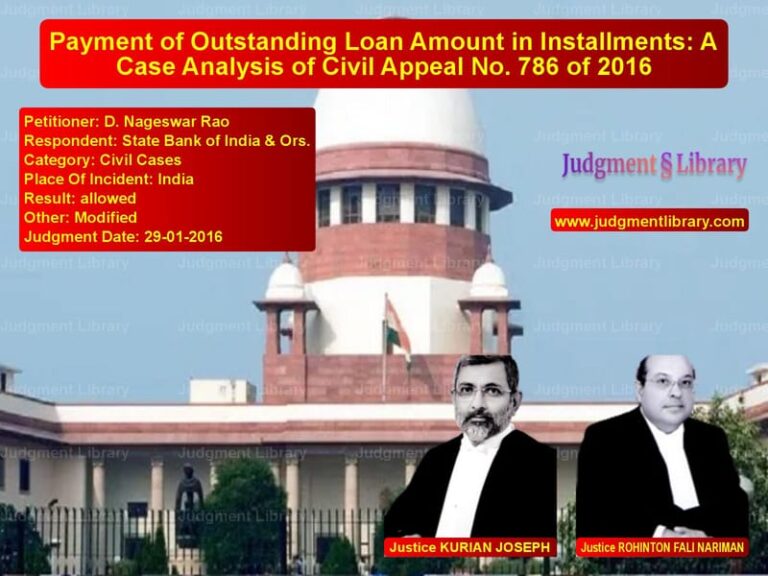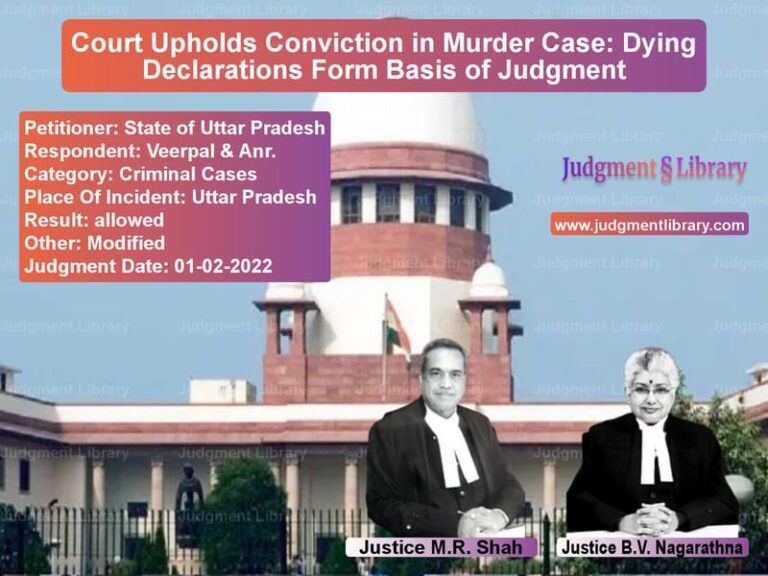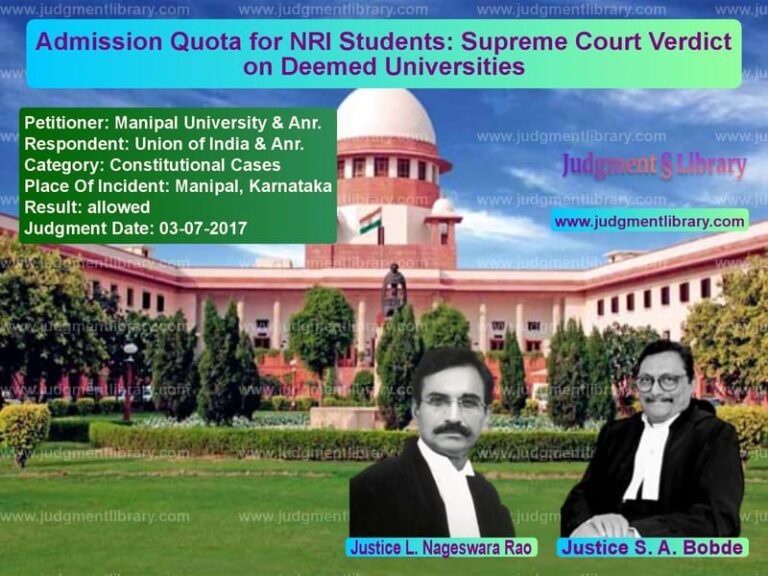Supreme Court Rejects Union of India’s Plea for Delay Condonation in Land Dispute Case
The case of Union of India & Anr. vs. Jahangir Byramji Jeejeebhoy revolves around the legal principles governing delay condonation in civil litigation. The Supreme Court addressed whether a delay of more than 12 years in seeking the restoration of a writ petition could be excused, especially when the litigant is a government entity. The ruling reaffirms that the law of limitation applies equally to the government and private parties.
Background of the Case
The dispute arose over a property in Pune Cantonment, which was leased by the respondent, Jahangir Byramji Jeejeebhoy, to the Union of India. The respondent alleged that the government had violated the lease terms and filed Civil Suit No. 2599 of 1981 for possession and arrears of rent.
The trial court ruled in favor of the respondent on May 2, 1987, ordering the government to vacate the premises and pay damages. The government appealed, but the District Judge upheld the order on August 29, 1992. Subsequently, the Union of India filed Writ Petition No. 2307 of 1993 before the Bombay High Court, which was dismissed for non-prosecution on October 10, 2006.
Over a decade later, on April 12, 2019, the government sought to restore the petition and filed an application for condonation of a 12-year and 158-day delay. The Bombay High Court denied the application, leading to the appeal before the Supreme Court.
Key Legal Issues
- Whether the Union of India provided sufficient cause to justify condonation of the 12-year delay.
- Whether government entities should be granted special treatment in delay condonation matters.
- Whether the respondent’s rights would be prejudiced by restoring the writ petition.
Arguments by the Appellants (Union of India)
The government contended that it had a strong case on merits and that public interest warranted the condonation of delay. The Attorney General argued:
“The suit property is located within the Pune Cantonment, which belongs to the Union of India. A private party should not be allowed to take over government land merely because of procedural lapses.”
However, when asked to explain the delay, the government failed to provide a convincing reason.
Arguments by the Respondent
The respondent opposed the delay condonation, arguing:
“The government has shown complete inaction for over a decade. No explanation has been given for why the matter was not pursued diligently.”
The respondent further contended that it would be unjust to reopen litigation after 12 years when he had already obtained possession rights through legal proceedings.
Supreme Court’s Analysis
1. Applicability of Delay Condonation Principles
The Court reiterated that condonation of delay is an exception, not a rule. It observed:
“The law of limitation binds everyone, including the government. If a party fails to act diligently for over a decade, it cannot expect special treatment.”
The Court also emphasized that delay should not be condoned merely on the ground that the petitioner has a good case on merits.
2. Government’s Lack of Diligence
The Court criticized the government’s failure to act in a timely manner:
“It would be a mockery of justice to condone such an inordinate delay when no sufficient cause has been demonstrated.”
The Court noted that the government had received notice of the execution proceedings in 2016 but still took three more years to file the restoration application.
3. Precedents on Delay Condonation
The Supreme Court cited several past judgments, including:
- Postmaster General v. Living Media India Ltd. (2012) – Holding that government departments should not be given special treatment in delay condonation cases.
- Oriental Aroma Chemical Industries Ltd. v. Gujarat Industrial Development Corporation (2010) – Stressing that delay should not be condoned in the absence of reasonable explanation.
- Lanka Venkateswarlu v. State of Andhra Pradesh (2011) – Reiterating that procedural laxity does not justify condonation of delay.
4. Balance of Justice
The Court ruled that condoning the delay would unfairly burden the respondent:
“Litigation should not be an endless process where one party is kept in uncertainty for decades. The respondent has waited long enough to enforce his decree.”
Final Judgment
The Supreme Court dismissed the appeal, affirming the High Court’s decision to reject the delay condonation request:
“The appeal is devoid of merit. The delay of 12 years and 158 days cannot be condoned.”
The Court further held that the Union of India must comply with the eviction order.
Key Takeaways from the Judgment
- The law of limitation applies equally to government and private parties.
- Mere possession of a strong case on merits does not justify delay condonation.
- The burden is on the petitioner to provide a reasonable explanation for delay.
- The Court prioritizes judicial efficiency and the rights of the opposite party.
Judgment Date: April 3, 2024
Judges: Aniruddha Bose, J.B. Pardiwala
Petitioner Name: Union of India & Anr..Respondent Name: Jahangir Byramji Jeejeebhoy.Judgment By: Justice Aniruddha Bose, Justice J.B. Pardiwala.Place Of Incident: Pune, Maharashtra.Judgment Date: 03-04-2024.
Don’t miss out on the full details! Download the complete judgment in PDF format below and gain valuable insights instantly!
Download Judgment: union-of-india-&-anr-vs-jahangir-byramji-jee-supreme-court-of-india-judgment-dated-03-04-2024.pdf
Directly Download Judgment: Directly download this Judgment
See all petitions in Property Disputes
See all petitions in Landlord-Tenant Disputes
See all petitions in Specific Performance
See all petitions in Judgment by Aniruddha Bose
See all petitions in Judgment by J.B. Pardiwala
See all petitions in dismissed
See all petitions in supreme court of India judgments April 2024
See all petitions in 2024 judgments
See all posts in Civil Cases Category
See all allowed petitions in Civil Cases Category
See all Dismissed petitions in Civil Cases Category
See all partially allowed petitions in Civil Cases Category







